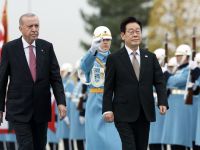British Prime Minister Tony Blair arrived in Damascus late Tuesday on the first official visit by a British premier to Syria, during which he will urge President Bashar Al Assad to help calm the Middle East crisis.
The trip is Blair's latest mission in a hectic round of shuttle diplomacy aiming to shore up the US-led coalition against terrorism as the war on Afghanistan intensifies, said AFP.
According to press reports, Blair, who was met at the airport by Syrian Foreign Minister Faruq Al Shara, will travel to a number of key Middle East states in the next two days for top-level talks with major players in the region whose support is vital to maintain the coalition.
A Downing Street spokesman traveling with the prime minister said: "Damascus has strongly denounced (the attacks on the US of) Sept. 11, therefore we believe there is a recognition that Sept. 11 has changed everyone's approach."
Syria has, however, refrained from supporting the US-led attacks on Afghanistan. Instead, it prefers a war against terrorism under the aegis of the United Nations.
For several years, Syria has figured on a US list of countries sponsoring terrorism.
Damascus rejects the accusation, arguing that the Palestinian organizations to which it gives haven, as well as the Lebanese Hizbollah, which it supports, are only resistance movements, whose national struggle against Israel is recognized by international law.
However, "Syria knows our position on terrorism," said the Downing Street spokesman.
"Syria is in no doubt that we believe terrorism in the region is counter-productive and we need a period of calm."
The official added: "The Syrians have asked to see us. They have strongly condemned Sept. 11 and therefore it is a chance of real engagement.
"I think the Syrians recognize that there is a chance to build a new relationship and a new understanding."
Numerous reports referred to Syria as a candidate for further US attacks against suspected terrorists and the countries harboring them.
Sources in Hizbollah told the Beirut-based Daily Star on Monday that Syria wanted a halt to anti-Israeli operations for the time being.
The resistance movement's last two attcks on the Israeli-occupied Shabaa Farms were reportedly not coordinated with Damascus, as is usually the case.
Blair, who left London Tuesday afternoon, is due to meet Assad Wednesday morning for talks.
According to This Is London Online, “Blair is hoping that President Assad can be persuaded to help rein in the [Popular Front for the Liberation of Palestine] and the other radical Palestinian and Islamist groups committed to violence against Israel.”
The British spokesman added: "We are not pretending we can resolve every difference in the region ... what is important is that we focus on the chance to have a constructive engagement.
"The important thing is that everyone uses their influence to bring about an end to violence.
"Syria has strongly condemned Sept. 11. After Sept. 11, there is a new environment, there is a chance to use that momentum. Let's build on that."
On Wednesday, Blair will become the latest in a line of Western ministers to court Saudi Arabia, according to local and international media reports which, however, have not been confirmed by Downing Street.
The monarchy of the conservative Saudi Arabian kingdom has made it clear to strategic ally Washington that it will not be party to the bombing of Afghanistan.
This Middle East visit is Blair's fourth big foreign shuttle trip since Sept. 11.
He has been to Berlin, Paris, New York, Washington, an EU summit in Brussels, then to Moscow, Islamabad and New Delhi, and on a third round which took in Oman and Egypt.
The BBC Online said that Blair did meet with Shara in the country's capital Damascus on Tuesday night.
He is later expected to meet Israel Prime Minister Ariel Sharon in Israel, and Palestinian President Yasser Arafat in the Palestinian territories.
According to the BBC, Blair's latest diplomatic mission came as opposition leader Ian Duncan Smith accused him of "losing the hearts and minds of the British public" over the war on terrorism.
He warned that the government was failing to get its message across about the objectives of the military offensive in Afghanistan – Albawaba.com
© 2001 Al Bawaba (www.albawaba.com)







